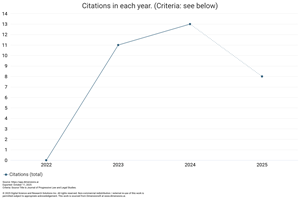Normative Juridical Review Regarding Bank Interest in Islamic Law
DOI:
https://doi.org/10.59653/jplls.v1i02.30Keywords:
bank interest, Islamic law, Islamic finance, contractualist, equalityAbstract
This journal aims to examine the concept of bank interest (riba) within the framework of Islamic law (Sharia). The practice of charging and receiving interest has been a topic of significant debate and controversy among Islamic scholars and jurists. This paper provides an in-depth analysis of the philosophical underpinnings of bank interest in Islamic law, taking into account various perspectives and interpretations within the Islamic legal tradition. The journal begins by exploring the foundational principles of Islamic law and its ethical framework, highlighting the prohibition of riba as outlined in the Quran and the Hadith. It discusses the historical context and evolution of Islamic banking and finance, emphasizing the need for alternative financial mechanisms that comply with Islamic principles. The study then delves into the philosophical considerations surrounding bank interest from an Islamic legal perspective. It examines different schools of thought and the rationale behind their positions, including the arguments for and against the permissibility of bank interest. The utilitarian perspective evaluates the societal consequences of interest-based transactions, while the deontological approach emphasizes the adherence to moral principles. The contractualist viewpoint focuses on the voluntary agreements between parties, and the concept of justice and equality is examined in relation to interest-based transactions. Furthermore, the journal analyzes contemporary practices in Islamic banking and finance, including the development of Islamic financial instruments that adhere to Sharia principles. It explores the role of regulatory bodies in overseeing and ensuring compliance with Islamic law in the financial industry. The research concludes by synthesizing the diverse perspectives and providing a comprehensive understanding of the philosophical considerations surrounding bank interest in Islamic law. It emphasizes the importance of contextual interpretation and critical analysis within the Islamic legal tradition to address the challenges and complexities posed by modern financial systems.
Downloads
References
Aly, H. N., & Bustomi, B. (2022). The Use of Economic Jargon as A Method of Quranic Education for Business People. Madania: Jurnal Kajian Keislaman, 25(2). https://doi.org/10.29300/madania.v25i2.5751
Budiutomo, T. (2014). BUNGA BANK DALAM PERSPEKTIF ISLAM. Academy of Education Journal, 5(1 SE-Articles). https://doi.org/10.47200/aoej.v5i1.110
Departemen Agama, R. (2007). Alquran dan terjemahan. Al-Qur’an Terjemahan.
Dewantara, A., & Bawono, A. (2020). INFLUENCE ANALISYS OF MUDHARABAH, MUSHARAKAH, AND MURABAHAH FINANCING TO PROFITABILITY OF SHARIA COMMERCIAL BANK IN INDONESIA …. … : Jurnal Ekonomi Islam.
Fink, M., Gartner, J., Harms, R., & Hatak, I. (2023). Ethical Orientation and Research Misconduct Among Business Researchers Under the Condition of Autonomy and Competition. Journal of Business Ethics, 183(2). https://doi.org/10.1007/s10551-022-05043-y
Haqiqi, M., Ikhsan, M., Fahruli, S., Mahfudz, Y. N., & Saputra, O. (2022). TADARRUJ FI AT-TASYRI’ KEHARAMAN RIBA DALAM TAFSIR AL-MISBAH DENGAN PENDEKATAN LINGUISTIK. BASHA’IR: JURNAL STUDI AL-QUR’AN DAN TAFSIR. https://doi.org/10.47498/bashair.v2i1.888
IMRAN, S. Y., & APRIPARI, A. (2022). Determination Of The Judges Freedom In Indonesia On The Straf Minimum Rules. Protection: Journal Of Land And Environmental Law, 1(1). https://doi.org/10.38142/pjlel.v1i1.281
Kasdi, A. (2013). Analisis Bunga Bank Dalam Pandangan Fiqih. Iqtishadia: Jurnal Kajian Ekonomi Dan Bisnis Islam STAIN Kudus, 6(2).
Khofiya, K. (2023). “Riba Bukan Hanya Soal Bunga Bank?! Apa Penjelasannya?” Program Studi Ekonomi Islam. https://islamic-economics.uii.ac.id/riba-bunga-bank/
Lee, S. P., & Isa, M. (2023). Environmental, social and governance (ESG) practices and financial performance of Shariah-compliant companies in Malaysia. Journal of Islamic Accounting and Business Research, 14(2). https://doi.org/10.1108/JIABR-06-2020-0183
Rodin, D., Anwar, R., Truna, D. S., & Darmalaksana, W. (2021). THE STATE AND THE HOLY QURAN: POLITICS OF THE QURAN TRANSLATION BY THE MINISTRY OF RELIGIOUS AFFAIRS. ILMU USHULUDDIN, 8(1).
Setyowati, R., & Prabowo, B. A. (2021). Sharia principles in the financial services authority regulation on dispute settlement alternatives. Sriwijaya Law Review, 5(1). https://doi.org/10.28946/slrev.Vol5.Iss1.603.pp56-70
Shihab, M. Q. (2005). Tafsir Al-Mishbah Jilid 10. In Lentera Hati.
Siregar, E. S., & Irmayuliana, I. (2022). The Effect of Murabahah, Mudharabah, and Musharakah Financing on Net Profit Growth in Bank Muamalat Indonesia. Jurnal BAABU AL-ILMI: Ekonomi Dan Perbankan Syariah, 7(1). https://doi.org/10.29300/ba.v7i1.6487
Wahyanto, T., & Setyadi, Y. (2023). RIBA ANALYSIS IN BANK INTEREST VIEWED FROM THE PERSPECTIVE OF ISLAMIC LEGAL PHILOSOPHY. INTERNATIONAL JOURNAL OF HUMANITIES ….
Zainuddin, Z., & Zainuddin, A. S. (2022). Lafaz Al Bai’u Mistlu Al Riba dalam Surah Al Baqarah Ayat 275. Jurnal Ilmiah Al-Mu’ashirah, 19(1). https://doi.org/10.22373/jim.v19i1.12309
Downloads
Published
How to Cite
Issue
Section
License
Copyright (c) 2023 Christopher Panal Lumban Gaol

This work is licensed under a Creative Commons Attribution-ShareAlike 4.0 International License.
Authors who publish with this journal agree to the following terms:
- Authors retain copyright and grant the journal right of first publication with the work simultaneously licensed under a Creative Commons Attribution-ShareAlike that allows others to share the work with an acknowledgement of the work's authorship and initial publication in this journal.
- Authors are able to enter into separate, additional contractual arrangements for the non-exclusive distribution of the journal's published version of the work (e.g., post it to an institutional repository or publish it in a book), with an acknowledgement of its initial publication in this journal.
- Authors are permitted and encouraged to post their work online (e.g., in institutional repositories or on their website) prior to and during the submission process, as it can lead to productive exchanges, as well as earlier and greater citation of published work (See The Effect of Open Access).
























